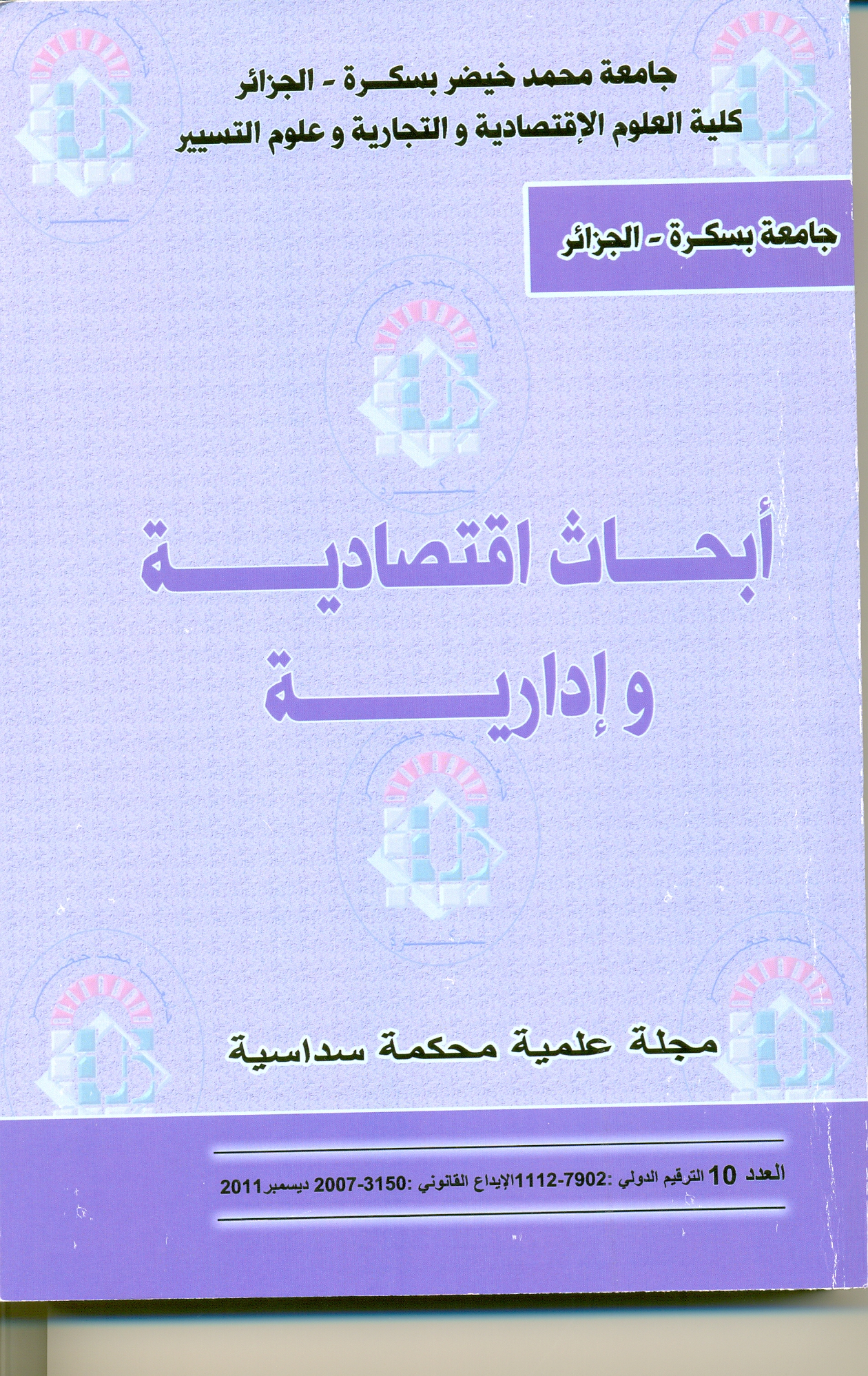أهميـة الأسس الإستـراتيجية والتكنولوجية في تطبيق إدارة المعرفة (دراسة تحليلية لآراء إطارات المديرية الجهوية للصندوق الوطني للسكن) بولاية بسكرة - الجزائر-
الملخص
أنجزت هذه الدراسة بغرض الكشف عن مدى أهمية الأسس الإستراتيجية والتكنولوجية في تطبيق إدارة المعرفة، بالمديرية الجهوية للصندوق الوطني للسكن بولاية بسكرة الجزائرية، من وجهة نظر إطاراتها. ولتحقيق ذلك هيكلت الدراسة في ثلاث محاور أساسية. بحيث غطى الأول منها إطارها المنهجي، الذي تضمن بشكل خاص إشكالية البحث وتساؤلاته والفرضيات المنبثقة عنها، بينما وجه الثاني لبناء المرجعية النظرية للبحث التي عالجت مفهوم إدارة المعرفة من زوايا محددة، كما أوضحت مختلف مراحل عملية إدارة المعرفة، فضلا على طبيعة أسس تطبيقها من خلال متابعة تحليلية لبعض ما ورد في الأدبيات التي تناولت الموضوع، والتي تم إسنادها بست دراسات سابقة. ليستعرض المحور الأخير من خلال أساليب لعرض وتحليل النتائج، أعتمد فيها على العديد من الأدوات الإحصائية كالتكرارات، النسب المئوية، المتوسطات المرجحة، الانحرافات المعيارية، الارتباط الخطي البسيط والمتعدد، الانحدار المتعدد وما يرتبط بها من اختبارات سلسلة من الاستنتاجات والاقتراحات، من أهمها ما يلي:
- هناك اختلاف في مستويات أهمية مراحل عملية إدارة المعرفة.
- تمثل الأسس الإستراتيجية متطلبات ضرورية وهامة لتطبيق إدارة المعرفة.
- تعتبر القيادة والثقافة التنظيمية من أهم الأسس الإستراتيجية لتطبيق إدارة المعرفة.
- تعد الأسس التكنولوجية أقل أهمية من مثيلتها الإستراتيجية في تطبيق إدارة المعرفة.
- تعتبر البنية التحتية لتكنولوجيا المعلومات من أقوى الأسس التكنولوجية في تطبيق إدارة المعرفة.
- تعد نظم الذكاء الاصطناعي الأساس التكنولوجي الوحيد الذي لم تتأكد أهميته في تطبيق إدارة المعرفة.
- ينبغي بناء نظم لتحفيز الأفراد على المشاركة والتعاون بغرض تبادل ونقل المعارف، مع الإعداد لتكييف البنية التنظيمية لتكون أكثر ملائمة مع نظام إدارة المعرفة.
- ينبغي دعم البيئة التنظيمية المساعدة على تطبيق إدارة المعرفة، بالتركيز خاصة على القيادة والثقافة التنظيمية.
- يجب التحضير للدخول في أنشطة جديدة لاستثمار الطاقات المتاحة لدى الموارد البشرية.
- يجب الاستمرار في بناء وتطوير البنية التحتية لتكنولوجيا المعلومات.
الكلمات الدالة: عملية إدارة المعرفة، القيادة والثقافة التنظيمية، خرائط المعرفة وشبكات القيمة، البنية التحتية لتكنولوجيا المعلومات، تكنولوجيا الشبكات وأدوات التعاون، نظم الذكاء الاصطناعي، اليقظة التكنولوجية والتنافسية.
Abstract
This study is achieved in order to find out the importance of the strategic and technological bases in the application of knowledge management (KM), at the Regional Department of the National Fund for housing in the Province of Biskra in Algeria, from the managers’ Point of view.
To achieve this Objective we have structured our study in three main axes. The first one covered the methodic framework, which included in particular the problematic of research, its questions and hypotheses. While the second is oriented to the research theoretical construction, which treated the concept of KM from different angles, and explained the various stages of the knowledge management process, as well as the nature of the application bases through a follow-up analysis of what appeared in the literature related to the subject, which were supported by six previous studies. Ending with the last axis that reviewed the methods of presentation and results analysis by adopting many of statistical tools like frequencies, percentages, weighted averages, standard deviations, simple and multiple linear correlation, multiple regressions and the associated multi-tests, to a series of conclusions and suggestions, which the most important are the following:
- There is a difference in the levels of importance of knowledge management process stages.
- The strategic bases are considered as a necessary and a very important requirement for the application of KM.
- The leadership and organizational culture are the most important strategic bases for the application of KM.
- The technological bases are less importance than the strategic bases in the application of KM.
- The information technology infrastructure is one of the strongest technological bases in the application of KM.
- The artificial intelligence systems are the only technological base, which has the incertitude significance in the application of KM.
- The systems should be built to motivate individuals to participate and cooperate in order to exchange and transfer the knowledge with the preparation of organizational structure to be more adoptive to the knowledge management system.
- The regulatory environment in knowledge management application should be supported focusing on leadership and organizational culture in particular.
- New activities should be prepared to invest in the available potential of human resources.
- Managers should keep on building and developing for information technology infrastructure.
Keys Words: Knowledge Management Process, Organizational Culture & Leadership, Knowledge Maps & Value Networks, Information Technology Infrastructure, Networks Technology & Collaboration Tools, Artificial Intelligence Systems, Business & Competitive Intelligence

